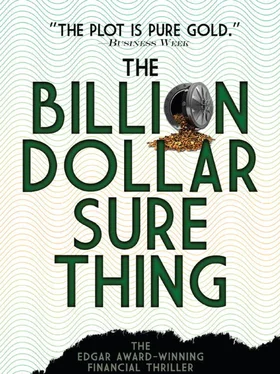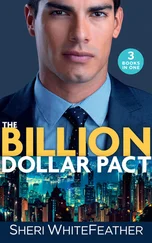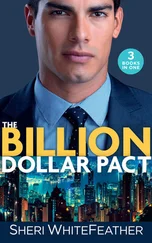“Uncle Walter insisted I come into his bank today to look around, and he thought that this might be one of the most interesting spots. I know really nothing about the foreign exchange business. But I have worked on the business section of our paper for over two years now and am not totally ignorant. My mother and I are spending a week here in Zurich. It sure is a lovely city at this time of year. Are you from here?”
“Yes,” replied Zimmerer.
A man suddenly shouted across the room at him. “Herr Zimmerer, the Deutsche Bank in Stuttgart wants $25 million spot at 3.40 flat.”
“Sell ’em. Then everybody stop all trades. I want to know our exact positions to the franc in every currency within ten minutes. So hang up the phones and recheck everything.”
If he was to see Hofer, he wanted to know exactly where the department stood, right up to the minute.
Then another call. “Hey, Zimmerer, it’s Kellermann. He wants you right now. I’ll switch him to your phone—line five.”
Zimmerer picked up the phone, made a few notes, and hung up.
Turning back to Mary Rogers he said, “At the risk of oversimplifying things, why don’t I start by explaining what we’re doing here, and then give you an idea of how we do it. Would that be all right?”
She nodded.
“Good. I think the closest thing in your experience to our foreign exchange market here would be commodities. In Chicago they make markets for corn or wheat or soybeans, and many other similar products. There, like here, the market is split: they deal in what they call ‘actuals’ when the real product is changing hands right there and then, and they talk about ‘futures’ when a deal is made involving the delivery of the product at some time in the future—maybe in a month, three months, or even a year. Well, in foreign exchange it’s the same. We call the here and now transactions, where the product changes hands immediately in cash form, the spot market. Just think of it as where money changes hands on the spot. We call the futures market the forward market, and here also we deal for months or even years in advance of the actual closing of the transactions. But instead of agricultural products, the products in which we deal are different currencies—German marks, American dollars, Japanese yen—all of which have constantly changing prices depending upon supply and demand for them. Follow me?”
“Yes.”
“Fine. Now since we are in Switzerland, we usually go out from the Swiss franc. I mean, we usually price all the ‘products’ we deal in in terms of Swiss francs. Quite normal, I think.”
Again Mary nodded.
“Are you sure I’m not boring you?” asked Zimmerer.
“Oh no, please go on. It’s just fascinating.”
I’ll bet, thought Zimmerer, but plunged on anyway.
“Right. Now let’s take the American dollar. As you just heard that fellow yell from across the room, we are buying dollars at the spot rate of 3.40 francs. This can change from minute to minute, but the ultimate range is established by the government. The ‘most’ francs you can get for a dollar, under the rules agreed to in Switzerland in spring, 1973, is 3.4535. And the ‘least’ you can get is 3.3015. That’s what we call the upper and lower intervention points.”
“What happens if everybody is selling dollars like crazy and it goes down to 3.25?” asked Mary.
“It can’t. The Swiss government, through the National Bank, is obligated to buy dollars for Swiss francs at the 3.3015 limit and to keep supplying the market with Swiss francs, taking out dollars, until the market trend reverses itself.”
“Why?”
“Because the world has agreed to maintain fixed exchange rates—well, almost fixed, since as you see they can vary 4.5 percent within the band agreed upon. Without fixed rates, nobody in business or banking could plan ahead in international transactions. I mean, some Swiss watchmaker might sell a million dollars worth of watches in the States. But he might first get paid in dollars after three months. If he could not be sure of approximately how many francs this would give him, when he exchanged them, he would face enormous risks. After all, he pays his workers and suppliers in francs, not dollars. Right?”
“But in 1973 all these fixed rates were changed, weren’t they?”
“They were. But this happens quite seldom.”
“But it happened.”
“Right. And the Swiss watch exporters got smashed, at least those who had not protected themselves in the forward foreign exchange market.”
“Now I’ve heard about that,” said Mary, “but I don’t understand how you can do that.”
“O.K. but you’ll have to follow closely,” replied Zimmerer. “Now let’s stick with that watchmaker. He knows that he’s going to be paid a million dollars in three months, so—if he’s smart—he’ll come to us and sell these dollars in advance. ”
“Can you do that?”
“Sure. That, in fact, is what this whole business is about.”
“You mean he’s selling something that he hasn’t even got yet?”
“Absolutely right. It works like this. We, his bank, make an agreement with another bank—in this case, an American bank—which says in effect: We , General Bank of Switzerland, promise to deliver to you $1 million U.S. in three months. You, Chase Manhattan, promise to pay us 3.35 million francs for these dollars, upon delivery. You’ll notice that the dollar sells at a small discount on the current spot rate of 3.40 when it’s done on a three months forward basis. That’s because the market feels that it is probable that the dollar will weaken slightly in the period ahead. It’s been abnormally strong in recent weeks.”
“So then when the Swiss watchmaker finally gets his dollars, he knows exactly how many francs he’s going to get for them.”
“Exactly, otherwise he would take a risk, as I mentioned before.”
“But if he did not ‘sell his dollars forward,’ as you put it, he might have gotten more francs in the end. I mean, nobody can guarantee that the dollar will weaken.”
“Absolutely correct. If the dollar strengthened, and the spot rate went up to, say 3.45 after three months, he could sell his dollars then and get 3.45 million francs—or exactly 100,000 more than he will get by selling them ahead of time. That’s the cost of insurance.”
“I know you won’t believe this quite, but really I now start to understand this business. It’s not so complicated, is it—I mean, not when a man like you explains it. Tell me, how did you ever get into this fascinating business?”
“My uncle. I’ve got one, too, and he’s a friend of your uncle. He might even have known your mother, come to think of it. I’ll ask him. Anyway, I started at the General Bank about ten years ago, and after being trained in about ten different departments, I chose this one for a career. I like it very much.”
“Can girls do this, too?”
“Well, there’s no reason why not. But in Switzerland, you know, it’s still a little bit different than in the States.”
“Oh, I know. My mother told me. That’s why she left.”
“Maybe, Miss Rogers, we should try to finish our discussion on foreign exchange,” said Zimmerer, glancing at his watch.
“But I really don’t want to keep you if you have important things to do.”
“No, no. Now, do you have any questions?”
“Well, just one and then I’ll leave you alone. What about all those currency speculators we always read about? I mean, they’re hardly involved in the watch business.”
“No, Miss, they’re really just gamblers, gambling normally on a devaluation of a currency. It’s gotten to be very big business during the past five years. Lots of Americans are in it now, especially the big multinational corporations.”
Читать дальше












